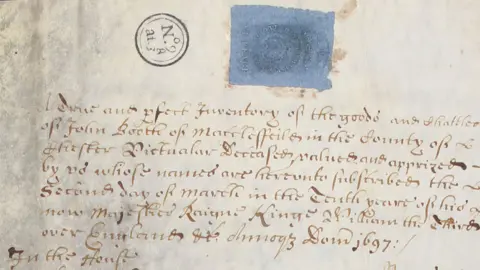Those Satanic Mills were around earlier than we thought.
The industrial revolution in Britain may have started 100 years before the mid-18th Century assumption, a study has found.
The Cambridge University research reveals a 17th Century surge in people producing goods and a decline in agricultural workers.
Experts analysed 160 million records - spanning three centuries.
Prof Leigh Shaw-Taylor said: "The story we tell ourselves about the history of Britain needs to be rewritten."
"We have discovered a shift towards employment in the making of goods that suggests Britain was already industrialising over a century before the Industrial Revolution," the professor of economic history said.
"Britain was already a nation of makers by the year 1700."
Cheshire archives & local studies
Probate inventories, such as this one for John Booth of Macclesfield in Cheshire in 1697, were among the millions of historic documents analysed
More than 160 million records, including census data, parish registers and probate records from the Elizabethan era to the eve of World War One, were analysed to compile
Cambridge University's Economies Past website.
This revealed a steep decline in agricultural peasantry in the 17th Century as people manufactured goods.
Workers included blacksmiths, shoemakers and wheelwrights and networks of home-based weavers producing cloth for wholesale. ...
https://www.bbc.com/news/uk-england-68730181



